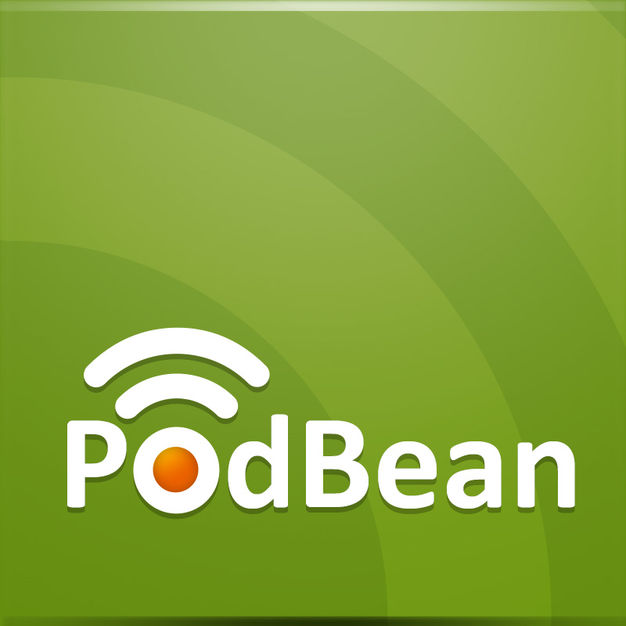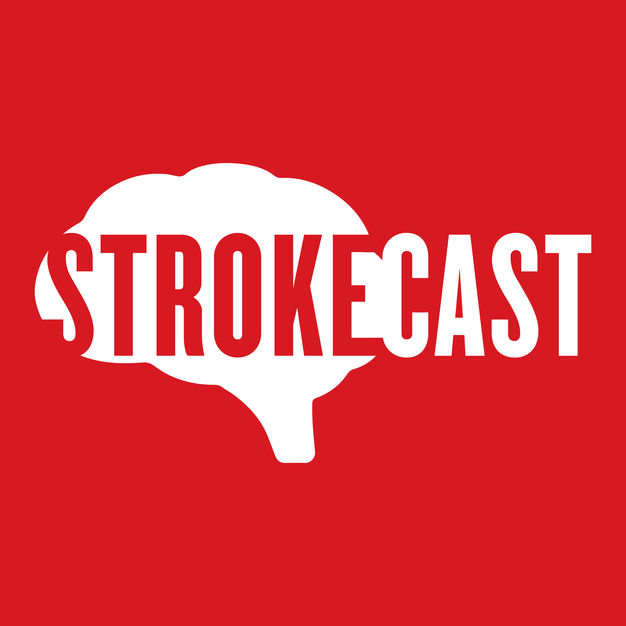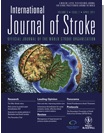
International Journal of Stroke: Podcast Series
International Journal of Stroke
The International Journal of Stroke podcast offers interviews with key figures in the field and highlights of current topics and issues.
- 11 minutes 5 secondsCerebrovascular events and outcomes in hospitalized patients with COVID-19: The SVIN COVID-19 Multinational Registry with Dr James Siegler
As COVID-19 continues to ravage health systems across the world we are still asking ourselves what are the risks for stroke patients that have contracted COVID-19. Carmen Lahiff-Jenkins, Managing Editor of the International Journal of Stroke, spoke to Dr James Siegler from Cooper Neurologic Institute, Cooper University Hospital, Camden, New Jersey in the USA about the retrospective observational cohort of consecutive adults evaluated in the emergency department and/or admitted with coronavirus disease 2019, across 31 hospitals in four countries. Of the 14,483 patients with laboratory-confirmed SARS-CoV-2, 172 were diagnosed with an acute cerebrovascular event recorded from the 1st of Feb until the 16th of June 2020.
If you enjoy our podcast series, please write a review as it helps others to find us.
The International Journal of Stroke is the flagship publication of the world Stroke Organisation, please consider becoming a member.
7 September 2020, 9:40 am - 13 minutes 3 secondsAntagonizing Dabigatran by Idarucizumab in Cases of Ischemic Stroke or Intracranial Hemorrhage in Germany – Updated Series of 120 Cases: Pawel Kermer
Idarucizumab is a monoclonal antibody fragment with high affinity for dabigatran reversing its anticoagulant effects within minutes. Patients with acute ischemic stroke on dabigatran treatment may become eligible for thrombolysis with rt-PA. In patients on dabigatran with intracerebral hemorrhage idarucizumab could prevent lesion growth. Carmen Lahiff-Jenkins, Managing Editor of the International Journal of Stroke spoke to Dr Pawel Kermer from Krankenhaus Sanderbusch; Neurology, Sande Germany.
Read the article link here
25 August 2020, 4:28 am - 19 minutes 34 secondsMobile Stroke Unit versus standard medical care in the management of patients with acute stroke with Dr. Nida Fatima
Mobile stroke units, otherwise known as MSUs have recently been introduced in the care of patients suspected of having an acute stroke, leading to shortening in the time to thrombolytics, but how does the clinical effectiveness in terms of functional outcome and survival among patients treated in MSU and/or conventional care compare?
Carmen Lahiff-Jenkins; Managing Editor of the International Journal of Stroke spoke to the very impressive Dr Nida Fatima from the Department of Neurosurgery, Massachusetts General Hospital, Boston, USA who was the corresponding author for the Mobile Stroke Unit versus Standard Medical Care in the Management of patients with Acute Stroke: a systematic review and meta-analysis.
19 August 2020, 5:32 am - 19 minutes 22 secondsPreceding Infection and Risk of Stroke: An Old Concept Revived by the COVID-19 Pandemic
Anecdotal reports and clinical observations have recently emerged suggesting a relationship between COVID-19 disease and stroke; highlighting the possibility that infected individuals may be more susceptible to cerebrovascular events
Carmen Lahiff-Jenkins, Managing Editor of the International Journal of Stroke (IJS) spoke to Kieron South and Craig Smith from the University of Manchester, two authors of the article Preceding Infection and Risk of Stroke: An Old Concept Revived by the COVID-19 Pandemic published in IJS.
Unfortunately, at the time of recording there was some difficulty with the internet, another COVID-19 affect, and so some of the discussion with Craig Smith is a little hard to hear. Please be patient with us. It can be difficult to get good internet working from home.
If you enjoy our podcast series with stroke practitioners and researchers from around the world, please do write a review, as we have it on good advice this helps others to find us.
IJS is the flagship publication of the World Stroke Organisation (WSO). The WSO is doing every thing we can to support our professional membership at this difficult time. Please stay tuned for our upcoming conference details in November. Also, we produce weekly webinars and educational content for our stroke community, please consider becoming a member.
30 July 2020, 2:22 am - 17 minutesStructural integrity of white matter tracts as a predictor of acute ischemic stroke outcome
Clinical assessment scores in acute ischemic stroke are only moderately correlated with lesion volume since lesion location is an important confounding factor. Many studies have investigated grey matter indicators of stroke severity but the understanding of white matter tract involvement is limited in the early phase after stroke. Carmen Lahiff-Jenkins, Managing Editor for the International Journal of Stroke spoke to Dr Deepthi Rajashekar from the Biomedical Engineering Graduate Program, Department of Radiology, University of Calgary and Professor Michael Hill Cumming School of Medicine, University of Calgary and Foothills Medical Centre. Both are authors of the manuscript Structural integrity of white matter tracts as a predictor of acute ischemic stroke outcome published recently in IJS. This study aimed to measure and model the involvement of WM tracts with respect to 24-hours post-stroke National Institutes of Health Stroke Scale (NIHSS) and have found that white matter tract integrity and lesion load are important predictors for clinical outcomes after acute ischemic stroke as measured by the NIHSS and should be integrated for predictive modelling.
Access the article here
21 July 2020, 12:24 pm - 23 minutes 48 secondsTaking Charge after stroke with Harry McNaughton
In health research we often hear, and pay lip service to the term ‘patient centred‘. Many of us would probably be hard pressed to devise entirely patient centred studies. "Take Charge’ is an impressive, novel, community-based self-directed rehabilitation intervention that helps a person with stroke to take charge of their own recovery.
In a previous randomised controlled trial, a single Take Charge session improved independence and health-related quality of life 12 months following stroke in Māori and Pacific New Zealanders.
This current study confirms that Take Charge; a low cost, person-centred, self-directed rehabilitation intervention after stroke – improved health-related quality of life and independence.
Carmen Lahiff-Jenkins Managing Editor of the International Journal of Stroke and spoke to Dr Harry McNaughton who conducted the study from the Medical Research Institute of New Zealand in the Stroke/Rehabilitation Research Department at Wellington Hospital.
Dr McNaughton and team tested the same intervention in three doses (zero, one or two sessions) in a larger study and in a broader non-Māori and non-Pacific population with stroke. We spoke to him about how this trial came about and how these really astounding results could change the way we look at some rehabilitation interventions.
This podcast is sponsored by the World Stroke Organisation
19 June 2020, 10:17 am - 14 minutes 11 secondsThe SAVE trial: sleep and stroke. Jingwei Li
Controversy and great interest exists regarding cardiovascular and cerebrovascular risk and it’s relationship to sleep duration. Carmen Lahiff-Jenkins, Managing Editor of the International Journal of Stroke spoke to Dr Jingwei Li from the George Institute for Global Health about the paper ‘Secondary analyses of the international, multicenter, Sleep Apnea Cardiovascular Endpoints trial’ other wise known as the SAVE trial.
If you enjoy this podcast series then please help spread the word, please share with your colleagues and write a review on the streaming service.
You can access the article here.
27 May 2020, 8:32 am - 25 minutes 36 secondsqTICI: Quantitative assessment of brain tissue reperfusion on digital subtraction angiograms of acute ischemic stroke patients
The thrombolysis in cerebral infarction scale otherwise known as the (TICI) scale is an important outcome measure to evaluate the quality of endovascular stroke therapy. The TICI scale is ordinal and observer dependent, so this means it may not result in the best prediction of patient outcome and can also provide an inconsistent reperfusion grading.
Carmen Lahiff Jenkins Managing Editor of the International Journal of Stroke spoke to Drs Haryadi Prasetya and Manon Kappelhof from Amsterdamn University Medical Centre two of the author group who submitted the article qTICI: Quantitative assessment of brain tissue reperfusion on digital subtraction angiograms of acute ischemic stroke patients. In this podcast we look at the authors investigations into qTICI and eTICI using image processing techniques based on the TICI methodology to develop better quality reperfusion grading.
The International Journal of Stroke is the flagship publish of the World Stroke Organisation
13 May 2020, 6:38 am - 14 minutes 24 secondsCerebrovascular disease is associated with an increased disease severity in patients with Coronavirus Disease 2019 (COVID-19)
Coronavirus disease 2019 (COVID-19) is an ongoing pandemic characterized by high morbidity and mortality. Clinical factors that can identify patients at risk for worse outcomes can help in developing risk stratification models for judicious use of healthcare resources. A team of researchers from Italy and the USA performed a pooled analysis of published studies, for assessing the impact of CVD in patients with COVID-19. They found CVD was associated with 2.5-fold enhanced risk of severe disease.
Carmen Lahiff-Jenkins, IJS Managing Editor spoke to Dr Gaurav Aggarwal from the Department of Medicine, Jersey City Medical Center, Jersey City, USA. Dr Gaurav Aggarwal is the submitting author for Cerebrovascular Disease is Associated with an Increased Disease Severity in Patients with Coronavirus Disease 2019 (COVID-19): which is a pooled analysis of published literature
22 April 2020, 12:53 pm - 38 minutes 36 secondsManagement of Acute Ischemic Stroke in Patients with COVID-19 Infection
On March 11th, 2020 the World Health Organization declared the COVID-19 infection a pandemic. We are currently in the throws of that global infection and the big question everyone is racing to ask and answer is the risk of ischemic stroke higher in patients with COVID-19 infection. We spoke to both Drs based in the United States Adnan Quereshi from the University of Missouri, Department of Neurology, and Vishal Jani from the Creighton University School of Medicine, Immanuel Medical Centre Omaha Nebraska, who is the corresponding author for the article “Management of Acute Ischemic Stroke in Patients with COVID-19 Infection: Report of an International Panel”
This important paper is from a team of doctors on the front line from the USA, Egypt, Turkey, Iran, Italy Taiwan, Pakistan, Poland, France and China and more presents a comprehensive set of practice implications in a single document for clinicians caring for adult patients with acute ischemic stroke with confirmed or suspected COVID-19 infection.
22 April 2020, 12:18 pm - 10 minutes 10 secondsSleep for Stroke Management and Recovery Trial (Sleep SMART): Rationale and methods
Obstructive sleep apnea is common among patients with acute ischemic stroke and is associated with reduced functional recovery and an increased risk for recurrent vascular events. The Sleep SMART trial is the first large trial to test whether aCPAP for obstructive sleep apnea after stroke/TIA reduces recurrent vascular events or death, and improves functional recovery.
Carmen Lahiff-Jenkins, Managing Editor of the International Journal of spoke to Professor Devin Brown from the department of Neurology, University of Michigan in the USA about this trial and its design and potential to influence how we use sleep tools to potentially improve clinical outcomes after TIA.
The International Journal of Stroke is the flagship publication of the World Stroke Organisation, please consider becoming a member.
Music is Kool Kats by Kevin McLeod
30 March 2020, 9:11 am - More Episodes? Get the App
Your feedback is valuable to us. Should you encounter any bugs, glitches, lack of functionality or other problems, please email us on [email protected] or join Moon.FM Telegram Group where you can talk directly to the dev team who are happy to answer any queries.
 Strokecast
Strokecast
 Videocast Podcasts for NINDS
Videocast Podcasts for NINDS
 UK Stroke Forum/International Journal of Stroke collaboration
UK Stroke Forum/International Journal of Stroke collaboration
 International Journal of Stroke
International Journal of Stroke
 Rehabilitation Edition; International Journal of Stroke Guest Eds Julie Bernhardt and Steven Cramer
Rehabilitation Edition; International Journal of Stroke Guest Eds Julie Bernhardt and Steven Cramer